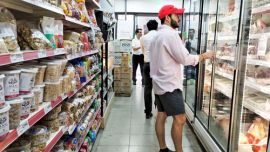Water as far as the eye can see, roads turned into canals, cattle searching for grass between the mud and lost crops – that is the catastrophic outlook across millions of hectares of the Argentine Pampas, which have been flooded for months now due to unusually heavy rainfall.
Alongside the downpours linked to climate change are other factors: a lack of maintenance on rural roads and drainage channels, and the halt of long-delayed infrastructure projects.
"I had to take my family away. In March we had to go to the nearest town so the kids could go to school,” said Luciano Macaroni, a cattle rancher from the district of 9 de Julio, Buenos Aires Province.
Macaroni can only enter or leave his land on horseback, the surrounding roads remain under water. Many other farmers face the same predicament across the fertile heart of Buenos Aires Province.
Some five million hectares – an area larger than that of Denmark – are either covered in water or inaccessible due to the flooding of roads, according to the Confederación de Asociaciones Rurales (Rural Associations Confederation).
“I wasn’t able to grow anything, the cows lost weight from just being in the water and I have no way to get in there with feed,” said Macaroni, 46.
A local once told folklore musician Atahualpa Yupanqui that the Pampas were “the world upside down.” Today, the sun and clouds are reflected in the region’s flooded fields, now vast lagoons where waterbirds glide.
Alejandro Vallan, a 43-year-old farmer, believes the consequences will truly make themselves felt next year.
“We can’t grow, we have no animals. What the hell are we going to do?” he said. “There are people aged 60 or 70 who’ve saved their whole lives to have their cows and now they’ve lost everything. They’re very unlikely to get them back.”
9 de Julio is one of the most affected of the 28 districts of the 28 declared in emergency by the Buenos Aires Province government. The flooding there has not receded since March.
The “catastrophic” situation “will cause a regional economic problem,” warned Hugo Enríquez, a farmer and chair of the local rural society, who said this will affect “transport, contractors, fields, stockpiling and suppliers.”
So far in 2025, precipitation in the district has exceeded 1,600 millimetres – nearly twice the annual average.
Just two years ago, the region endured one of the worst droughts in decades, causing losses of around US$20 billion.
“It’s clear there are matters related to climate change and fundamentally to the increasing frequency of very strong climate events,” said Buenos Aires Province Agriculture Development Minister, Javier Rodríguez.
Cindy Fernández, spokeswoman for the National Meteorological Service, explained that “if the atmosphere is hotter, there is more vapour in the air, and therefore more water available to fall in greater quantities.”
According to María José Gentile, the mayor of 9 de Julio, the influence of climate change is undoubtable. “Denying it is refusing to see reality,” she said.
The smell of stagnant water, clouds of mosquitoes and frogs abound on the rural roads of 9 de Julio. Built at a lower elevation than the surrounding fields, many have become canals that block farmers’ access.
Everyone agrees on the solution: public works. Refitting roads and canals, controlling the construction of illegal canals and finalising infrastructure projects that have been left pending for decades, such as dredging the Salado River, the only natural drainage outlet in the region.
Rodríguez said the provincial government is progressing with the works, but notes that, since the inauguration of President Javier Milei last December, the section overseen by the national government has been halted.
“If that hadn’t been stopped in 2023, that section would be complete and without a doubt it would drain water better,” he stated.
National Security Minister Patricia Bullrich has announced resources “to open up roads and reach isolated families” and said the dredging work is the responsibility of the province – which is governed by the opposition Peronist force.
“No-one takes responsibility; everyone blames whoever came before. We want solutions,” says cattle trader Raúl Daguerre.
Argentina’s agribusiness sector accounted for 58 percent of the country’s total exports in 2024 – a cornerstone of one of the world’s leading food producers.
related news
by Tomás Viola, AFP



















Comments